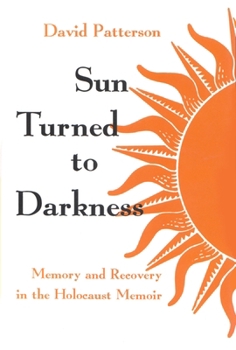Sun Turned to Darkness: Memory and Recovery in the Holocaust Memoir
(Part of the Religion, Theology and the Holocaust Series)
Select Format
Select Condition 
Book Overview
In examining the recorded memoirs of fifty Holocaust survivors, David Patterson draws on the teaching of the sacred texts of Jewish tradition and the philosophy of Emil Fackenheim and Emmanuel Levinas.
That memory, he argues, serves three purposes for Jews struggling to recover after the Holocaust. First, a recovery of tradition: Not only was the body of Israel targeted for destruction, but also its very soul, as that soul was defined by God, Torah, and sacred history. Second, a recovery from an illness: These Jews suffer from the illness of indifference that plagued heaven and earth throughout
the event. Third, these memoirs reveal the open-ended nature of recovery as a process that has no resolution: The survivors emerge from the camps, but the camps stay with the survivors and cast their shadow over the world. Readers are transformed into witnesses who face a never-ending process of remembrance, for the sacred, in spite of indifference.





